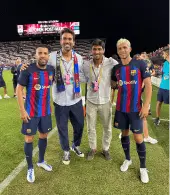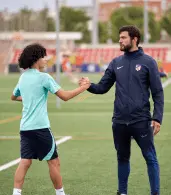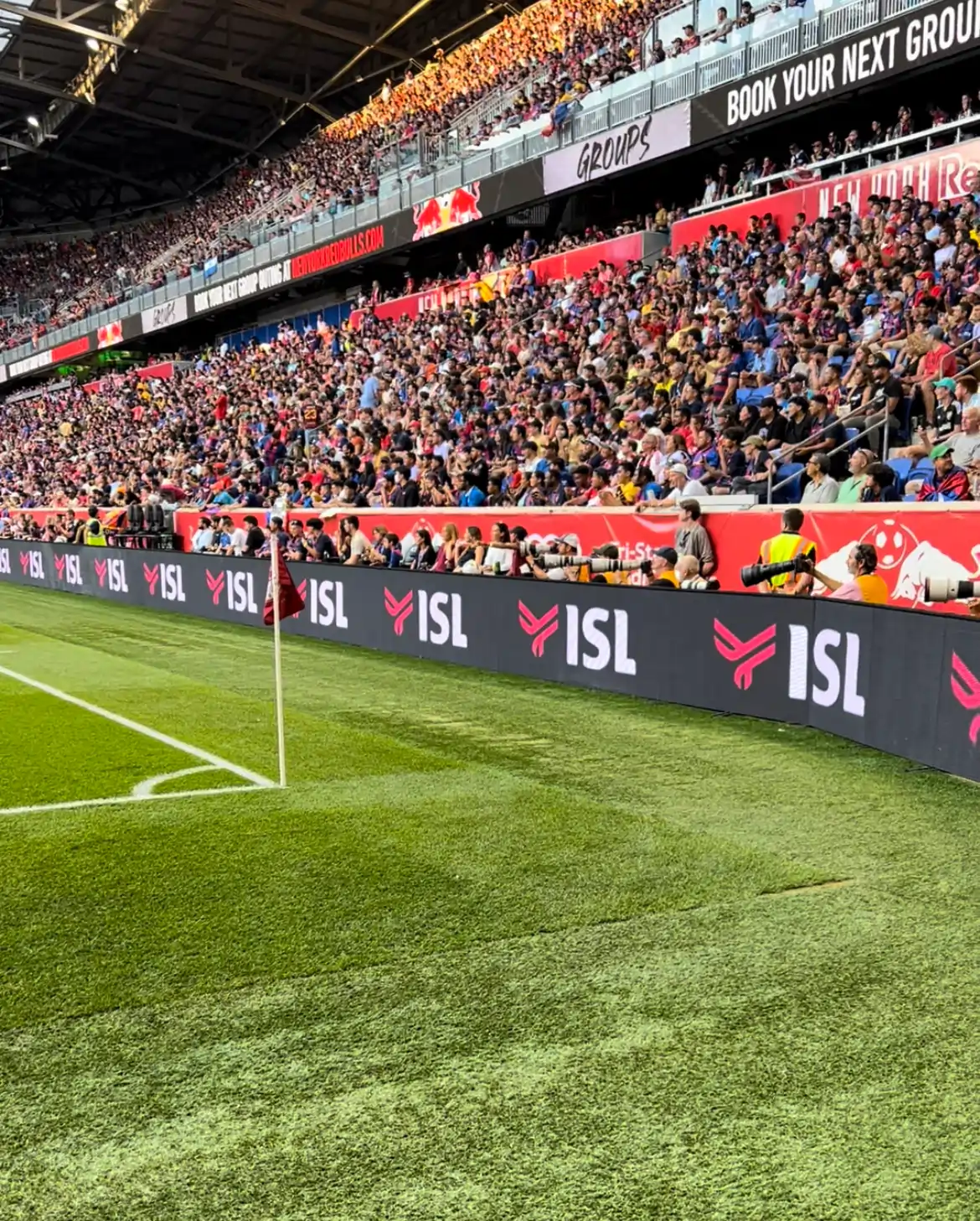




breathe
soccer







Sports transcend boundaries and borders, becoming a pivotal factor for travelers when selecting their destinations, offering tourists distinctive and memorable experiences. Our Brand Manager, Carlos Ramírez, delineates the sector’s rapid growth and our contribution to its expansion through a range of personalized soccer programs available year-round.
The World Tourism Organization states that sports tourism is one of the fastest-growing sectors in the travel industry. What factors do you believe contribute to this growth?
There are several factors which contribute to the rapid growth of sports tourism. The increasing popularity of sports globally has led to a rise in interest from travelers seeking to participate in or witness sporting events firsthand.
On the other hand, the desire for unique and memorable experiences drives individuals to incorporate sports into their travel plans, thus contributing to the sector’s growth. In many cases, sports have indeed become the deciding factor when choosing a travel destination, whether it’s to participate in an event, attend a game, visit a team’s stadium, and so on. This reason has turned sports into a significant attraction factor that enables certain tourist destinations to draw in new travelers and enhance their international brand.
And how sustainable do you think this growth is?
Major sports brands and competitions have achieved global recognition, transcending geographical boundaries to captivate audiences globally. With sports properties increasingly striving to extend their reach beyond national borders, the potential for sustained growth is enormous.
According to a study by the Barcelona Tourism Observatory, sports tourism accounts for nearly 20% of all visitors to the city. What’s ISL’s participation in this statistic?
The ISL Experience Team hosts various BSE (Barcelona Soccer Experience) trips each year for young soccer players from the US. During the current season, we will host a total of 5 BSE sessions for boys and 2 sessions which are exclusive for girls. Our partnership with FC Barcelona enhances the authenticity and appeal of these experiences, making us a key player in driving sports tourism to the city. Since 2015, over 6,000 young boys and girls and more than 15,000 people overall have traveled to Barcelona as part of our soccer programs, including players and families. The number of travelers continues to increase every year.
In which other cities does the Experience Department organize experiences?
Apart from Barcelona, the ISL Experience Department organizes other soccer experience programs in iconic cities like Madrid, Manchester, Lisbon, and Paris, among others. These destinations offer rich sporting heritage and vibrant cultures, providing travelers with immersive and unforgettable experiences beyond the pitch. We are also present in some of the most important youth soccer tournaments which offer our players the chance to test their level among the best in a competitive environment.
From your point of view, what is the main thing players coming via Futbol First look forward to in their trip?
In my opinion, what players and families traveling with Futbol First are seeking is to live a unique sports experience in every way. From experiencing training sessions with the best academies, such as FC Barcelona’s, and watching their team and idols play live, to facing local teams in friendly matches that allow them to test their level and enhance their experience. In addition to this, our trips always incorporate a cultural element through guided tours, which add an educational component that we consider key to providing a comprehensive experience.
How do football clubs benefit from sports tourism? Which new opportunities and revenue sources open up?
Football clubs benefit from sports tourism in various ways. Firstly, it allows clubs to expand their global fan base by engaging with supporters from different regions through international tours, friendlies, and fan experiences. Additionally, sports tourism opens up new revenue streams through ticket sales, merchandise purchases, sponsorships, and partnerships, further enhancing the club’s financial sustainability and brand recognition.
ISL has been tapping into this sector for many years now. How do you assess the Experience Department’s evolution over the past decade?
Over the past decade, the ISL Experience department has evolved significantly. We have refined our trip itineraries, diversified our destination portfolio, and incorporated innovative internal changes to streamline operations and deliver unparalleled service to our clients. Our commitment to excellence and continuous improvement, with special attention to detail, ensures that ISL remains a leader in sports tourism, providing transformative experiences for players and families alike.
How is the preparation for the new season coming along? What can we expect?
At the moment, we are working on the updates for the upcoming season, which for us begins in mid-June. Looking ahead to next year, our focus is on continuously incorporating innovations into our programs to offer an even better service and provide an enhanced experience for our clients. In this regard, we believe it is very important to listen to the opinions of the players and families who travel with us each year to understand what they like most and where they see room for improvement. This ongoing dialogue with our clients serves as the guiding principle to achieve excellence in everything we do.
ISL Agency announced one of the summer’s best international fixtures between two of Europe’s elite football clubs, Liverpool FC and Sevilla FC. The encounter took place at Liverpool’s legendary Anfield Stadium on August 11th, as the teams prepared for the 2024–25 season.
With this deal, ISL Agency continued its mission to help sports properties grow internationally. By closing agreements for elite matchups, ISL Agency supports clubs in expanding their international presence, engaging new fan bases, and enhancing revenue opportunities through ticket and merchandise sales.
This match was particularly significant as it served as one of the first appearances for the new head coaches of both teams. Arne Slot led Liverpool FC, succeeding Jürgen Klopp after his remarkable nine-year tenure, while Xavier García Pimienta began his journey as the Sevilla FC manager.
This match was part of a broader series of international fixtures closed by ISL Agency that summer. Another confirmed match was set for August 3rd, featuring Rennes and Real Sociedad at Roazhon Park, with further announcements made soon after.
About ISL Agency
Based in Barcelona and Miami, ISL Agency is a sports management and marketing agency focused on bringing international growth opportunities to major sports properties worldwide, offering tailor-made services and strategies to drive the growth and expansion of soccer properties and brands.
The renowned Barça Academy Soccer Camps returned to the US in June 2024. The camps began on June 10th and completed their journey across 36 cities by July 19th, reaching over 7,000 kids.
Players aged 6 to 17 experienced first-hand the Barça training methodology and philosophy, fostering a deep connection between FC Barcelona and its local fan base. This year marked another milestone for ISL, which had been the driving force behind the organization of Barça Academy Soccer Camps in America since 2012, reaching a record number of cities last summer.
This extensive reach underscored ISL’s commitment to supporting FC Barcelona’s expansion in the U.S., allowing young fans and their families to experience why Barça is more than just a club. Its influence continued to grow, with four official Barça Academies managed by ISL in the country.
These academies and the summer camps play a pivotal role in promoting soccer in the U.S., a country with a rich sporting culture and a growing passion for the world’s most popular sport.
As the U.S. gears up to co-host the World Cup in 2026, initiatives like the Barça Academy Soccer Camps are crucial in nurturing the next generation of soccer talent.
To celebrate the launch of X CRAZYFAST, the latest boot release from Adidas packed full of ‘AERO’ innovations, Adidas Spain gave the experience of a lifetime to the top Spanish content creators.
With all eyes on Miami after Lionel Messi’s arrival at Inter Miami CF, the city was the perfect choice for Koko DC, Adri Contreras, xBuyer, MiniBuyer, Laura Vizcaino, and Spursito, to live a football experience while promoting the new boots.
We used all of our expertise about North American football, the club, and the city, our home in the USA since 2018, to provide them with an amazing visit to Miami and unforgettable football moments.
ISL arranged for influencers exclusive access to the Florida Blue Training Center, Inter Miami’s training grounds, where they spent an afternoon playing and capturing some incredible content for their social media.
For our Managing Partner, Marc Segarra, having the brand and influencers coming from Spain makes the activation even more special: “It is always nice to welcome people from our country to our new home in America and be able to show them the access we have here in Miami and our relationship with Inter Miami. We are pretty excited that they have trusted us and we can make everybody feel at home.”
On October 27th, the group had another VIP experience, this time to watch Inter Miami in action in the Lamar Hunt US Open Cup final!
As they witnessed Houston Dynamo’s victory by 2×1 at the DRV PNK Stadium, the influencers enjoyed an extraordinary panoramic view of the pitch, premium service executive, and food & beverage.
It was a pleasure to be a part of such an unforgettable experience!
Nicole León, ISL Marketing Director, unveils the playbook on how sports properties harness and can further leverage digital marketing in their international expansion strategies. Join us for an insightful discussion as Nicole shares key insights and addresses crucial questions, shedding light on the strategies shaping global success in the digital era.
The shifts in consumer behavior within the sports industry are characterized by a substantial move towards non-traditional media channels driven by the acceleration of digital adoption. Approximately 40.7% of global sports fans now choose to stream live sports events through digital platforms. This trend signifies a significant departure from conventional methods of sports content consumption. Furthermore, there is an increased appetite for additional sports content, both related and unrelated to live matches, across an expanding array of platforms.
The demand for content related to live events, such as match announcements, short-term content, and highlights, is nearly as high as the demand for the events themselves. Similarly, non-live sports content, including docuseries and behind-the-scenes footage, has gained traction, attracting not only existing fans but also new audiences. Multi-screen viewing activities have become more prevalent, with the general population increasing its engagement in activities like social media, texting, gaming, and ordering food by an average of 5%, doubling to 10% among Gen Z, even during significant live events.
These shifts emphasize the need for brands and sports rights holders to stay connected to evolving consumer behaviors. As channel and device fragmentation continues to rise, adapting strategies to meet consumers on the right platforms and in the right ways becomes critical for successful engagement and international expansion.
The digital media platforms present football clubs with new avenues to connect and engage with fans in innovative ways directly. The immediacy of these platforms facilitates real-time communication, fostering a sense of community as fans actively participate in conversations, polls, and live events. Additionally, the global reach of digital media allows clubs to transcend geographical boundaries, connect with international audiences, and create a diverse and inclusive fan base. This not only enhances the club’s brand globally but also enables cultural exchange among fans from different regions.
Furthermore, digital platforms enable football clubs to deploy creative engagement methods, such as virtual events, exclusive behind-the-scenes content, and interactive initiatives. These strategies not only capture fans’ attention but also deepen their emotional connection to the club. The ability to personalize content delivery based on fan demographics and interests ensures a more targeted and meaningful engagement. Moreover, the analytics provided by digital platforms empower clubs to understand fan behavior, refine strategies, and make data-driven decisions, continually enhancing the overall fan experience.
In essence, digital media platforms are a dynamic tool that enables football clubs to forge direct connections, foster global communities, and explore innovative avenues for fan engagement.
The biggest challenge for sports properties in digital marketing lies in the fragmented digital landscape, making capturing and retaining fan attention increasingly difficult. As the digital space continues to diversify with various platforms and channels, reaching and maintaining a consistently engaged audience becomes a complex task for sports properties. The competition for fan attention across social media, streaming services, and other digital avenues requires strategic efforts to cut through the noise and deliver compelling content that resonates with diverse audiences.
In the fight for fan attention, the inherent power they possess to connect with fans and cultivate lifetime loyalty makes sports properties stand out. The emotional connection that fans develop with their favorite sports transcends mere fandom; it becomes a deeply ingrained aspect of their identity. This enduring loyalty provides sports properties with a unique advantage in capturing and retaining audience attention in the highly competitive digital landscape.
Additionally, the ability of sports properties, especially clubs, to create appealing and authentic storytelling sets them apart. Effective storytelling goes beyond the game itself, offering narratives that resonate with fans on a personal level. Whether through highlighting players’ journeys, historic moments, or community engagement, authentic storytelling fosters a deeper connection and emotional investment, making sports properties more memorable and compelling in the eyes of their audience.
Attracting younger fans demands a multifaceted approach for sustained engagement and growth. Football clubs can strategically optimize their digital presence by embracing popular platforms like TikTok and Instagram, tailoring content to the dynamics of each channel. Collaborating with influencers who resonate with the target demographic adds authenticity to the club’s messaging, while interactive content fosters active engagement. Aligning the club with broader cultural trends ensures relevance, and leveraging player stories and global community building enhances the overall fan experience.
However, the synergy between digital initiatives and physical engagements with clubs globally amplifies the impact of a young target. Expanding soccer clubs beyond their own territory through initiatives such as Summer Camps, Academies, and others not only fosters a sense of community but also provides tangible, real-world experiences, bridging the gap between the digital realm and reality.
These physical initiatives, complemented by digital ones, not only strengthen emotional ties but also offer opportunities for talent development, allowing clubs to identify and nurture young talents globally. By combining digital and physical strategies, football clubs create a comprehensive approach that reaches young fans on multiple levels, solidifying the club’s presence in their hearts and minds for the long term.
Having a fan base in different countries significantly expands clubs’ opportunities to generate new revenues. For European clubs, building a global fanbase serves as a strategic move to diversify their supporter base, reducing dependence on a single market. By strategically engaging fans through social media, targeted merchandise offerings, fan events, and local partnerships, clubs can cultivate a passionate and loyal following across borders.
A growing global fanbase not only enhances the club’s brand on an international scale but also contributes substantially to long-term sustainability. This diversified support base brings in additional revenue streams through various channels, including increased ticket sales for international matches or pre-season tours, elevated merchandise purchases from fans worldwide, and a boost in digital subscriptions for exclusive content and match streaming. The expansion into new markets not only broadens the financial landscape for clubs but also strengthens their overall resilience and market position in the dynamic world of football.
Developing relationships in other countries can give European clubs access to a vast talent pool. The American football landscape, for instance, has been evolving rapidly, with increased investment in youth development, academies, and professional leagues. By establishing partnerships with American clubs, scouting networks, or investing in youth academies, European clubs can tap into the American talent pool and identify potential players for their teams.
It is important to first understand the market and the culture the club wants to enter; it is not the same to expand in China and the USA, for example. Then, clubs have many possibilities for doing that, from local Summer Camps to international tours and pre-season friendlies with local clubs.
The current sports business landscape in the country, hosting the next FIFA World Cup, Olympics, and other relevant soccer events, presents substantial opportunities for European football clubs.
The United States represents a large and lucrative market where European clubs can strategically position themselves to capitalize on various revenue streams. European clubs can effectively tap into the American market by emphasizing key metrics such as revenue, sponsorship deals, and partnerships. The USA’s vast consumer base, robust economy, and deep-rooted passion for sports create significant opportunities for clubs to diversify their revenue sources beyond their home markets. Exploring avenues like merchandising, licensing agreements, and digital partnerships in the US can lead to additional income streams. Moreover, the increasing popularity of European football in the USA, driven by the growing fanbase and interest in major international competitions, further amplifies the potential for European clubs to strengthen their market presence and financial stability in the American sports business landscape.
The world is watching as football takes over the USA, which is happening not only due to Messi’s arrival but also because of the continuous investment and structuring of their male and female national leagues, the MLS and the NWSL, respectively, and the rising numbers of football, or soccer, fandom all around.
To achieve this status, USA football clubs and leagues have demonstrated excellent marketing and financial strategies, offering valuable lessons for more traditional European leagues.
Fan Engagement
MLS excels in fan engagement through various initiatives, including interactive fan experiences, social media, and community involvement. The marketing and promotion in North America and beyond also stands out.
Angel City FC, an NWSL club with a majority female ownership, is an exemplary model for building a community within a football club from the ground up. The MLS itself is committed to attracting younger fans and creating innovative content, as evidenced by its recent partnership with TikTok.
Sports properties all around the world can be inspired by such activations to expand their global reach and attract new fans, connecting with them on a personal level and building a more engaged and passionate fanbase.
Stadium Atmosphere
While there’s nothing quite like South American hinchas, the MLS and the NWSL have worked on creating a vibrant and family-friendly stadium atmosphere. Attention to every detail enhances the matchday experience, making it more comfortable and special for the fans. Austin FC, one of MLS’s clubs with the most engaged community, also does that by promoting activations like Pride Night.
North Americans have always been industry leaders when it comes to blending sports and entertainment. Basketball has exemplified this approach and become a global benchmark with its fast-paced on-court action, spectacular plays, and exciting events that extend beyond sports. This constant pursuit of the “show” has not only defined the USA sports experience but has also influenced how other sports are approached and enjoyed in the country.
Besides providing more entertaining matchday experiences, traditional leagues and clubs currently face the challenge of improving stadium facilities and promoting fan engagement. The USA offers valuable lessons on how to enhance the overall atmosphere.
Financial Transparency
American leagues have clear guidelines to ensure the league is financially sustainable, with teams following current regulations and promoting transparency. European football can benefit from such measures to ensure that clubs maintain financial stability and comply with fair play.
However, regarding tradition and technical quality, the USA draws much inspiration from South American and European football, which have paved the way for the league’s continued growth.
Technical Quality and Playing Style
LaLiga is known for its technical and possession-based style of play, Brazil for its creativity, attacking style, and skillful dribbling, the Premier League for its fast-paced and physical matches, and the Bundesliga for its attacking football and development of young talent.
The MLS and the NWSL are on the path to defining their own style of play and can learn from all these leagues how to improve the technical abilities of their players and promote a more attractive, skillful brand of soccer.
Talent Development
Especially in Europe, football academies are professionally structured and continuously develop top-level talent, which helps not only to attract audiences to their own leagues but also to improve the clubs’ finances with substantial fees for the transfer of players.
By investing in developing young talent in their academy systems, MLS and NWSL can produce more homegrown talent. It is crucial for the USA’s national football interest and international attention to create its own star players to guarantee sustainable growth and reduce its current dependency on expensive international signings.
International Scouting
European leagues have been successful in scouting and recruiting top international talent, particularly from Latin America and other parts of the world.
The North American leagues are already on the way, learning how to effectively scout and bring in international stars to raise the overall level of competition.
For over 10 years, ISL has been based in the USA and has developed extensive knowledge of how the sports market operates, specializing in translating business strategies and standards from one continent to another.
This expertise is key to helping European sports properties find perfect opportunities to expand to the USA, bridging the gap between each culture to develop projects that facilitate international growth effectively.